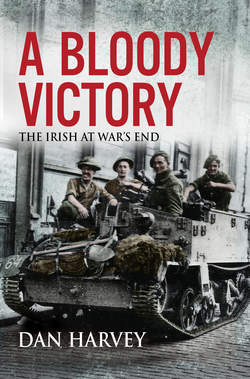Читать книгу A Bloody Victory - Dan Harvey - Страница 8
На сайте Литреса книга снята с продажи.
ОглавлениеACKNOWLEDGEMENTS
The Second World War was won with the help of the brave men and women who fought for the Allies in their hour of need. Those that took a principled stand against tyranny, for whatever motivation, ought to be respected rather than ignored. It is all too profound that it was an Irishman, Edmund Burke, who is attributed with the words, ‘All that is necessary for the triumph of evil is that good men do nothing.’
When it mattered, the Irish did far from nothing. It is now an established fact that large numbers of Irish men and women fought with the Allies to save Europe from the evils of Nazi fascism. This is something that the Irish have become increasingly aware of over more recent decades. Because this involvement was more comprehensive than previously thought, it is now necessary to recalibrate our understanding of this heretofore underrated participation.
Ireland’s double-edged ambiguity, arising from the State’s pragmatic ‘neutral’ stance during the war, has created many misunderstandings and misperceptions, giving rise to much misinformation, whereas for many of the Irish there was a clear-cut course of action to be taken. The Irish were among the rangers, the commandos and the commanders; the airmen in the skies above and the sailors on the ships at sea. They all accepted the risks and exposed themselves to harm; they put themselves into the line of fire by entering deadly battle spaces, from the war’s very beginning to its very end.
I wrote this book to make people aware that those Irish men and women who participated in the war were part of a broad, outward-looking nationalistic narrative, acting for Ireland and standing shoulder to shoulder with the Allies. On Remembrance Sunday 2019, at St Patrick’s Cathedral in Dublin, Canon David Oxley, the prebendary of St Audoen’s, reported in The Irish Times that Irish neutrality in the Second World War was understandable from a political point of view. However, he added that, from a moral point of view,
it was hardly possible to remain neutral in the face of the kind of evil represented by fascism. Many individual Irishmen and women did in fact take sides and volunteered to oppose Nazism in arms, and we commemorate their sacrifice this afternoon. And I suppose what I want to say to you is just this: in the conflict between right and wrong, truth and falsehood, neutrality is not an option.
These Irish men and women deserve our grateful appreciation and to be rightfully honoured – not written out of Irish history, taken off the beaches at D-Day, the bridge at Arnhem, the skies above in the Battle of Britain, or the many other battles during the war. Instead, they ought to be put centre stage; they ought to be in our school textbooks as examples of courage, character and commitment to steadfast values of resilience, fighting to maintain our freedoms, values and our democratic way of life. Indifference, indecision and uncertainty in the face of challenges to these freedoms are a threat – one which could unravel the very fabric and fortitude at the core of our being. Peace and freedom cannot be taken for granted and must be valued and defended.
I am grateful, therefore, to all those who gave me new information about those who contributed to the war effort. Specifically, I would like to thank Peter Byrne, Commandant (retd), who supplied an account of his cousin, US Ranger Sergeant Pearse Edmund ‘Ed’ Ryan, at Pointe du Hoc on D-Day. Thanks also to Tom Burns, who made me aware of his father James Gerald ‘Jimmy’ Burns and his participation with Bomber Command, and to Brian Wallace, who showed me the (flying) log book of his father, William Andrew ‘Bill’ Wallace, who was shot down over the beaches on D-Day. To Sarah Bermingham, who contributed detail about her uncle John O’Neill and his involvement at Arnhem, I am indebted. To Turtle Bunbury, who informed me of his grandfather William Robert McClintoch Bunbury, I am similarly thankful. Sincere thanks also to Conor Graham, Maeve Convery and Patrick O’Donoghue at Merrion Press for handling the book’s publication, Deirdre Maxwell for typing out the hand-written manuscript, Myles McCionnaith for editing the manuscript, and Paul O’Flynn for his technical assistance.
